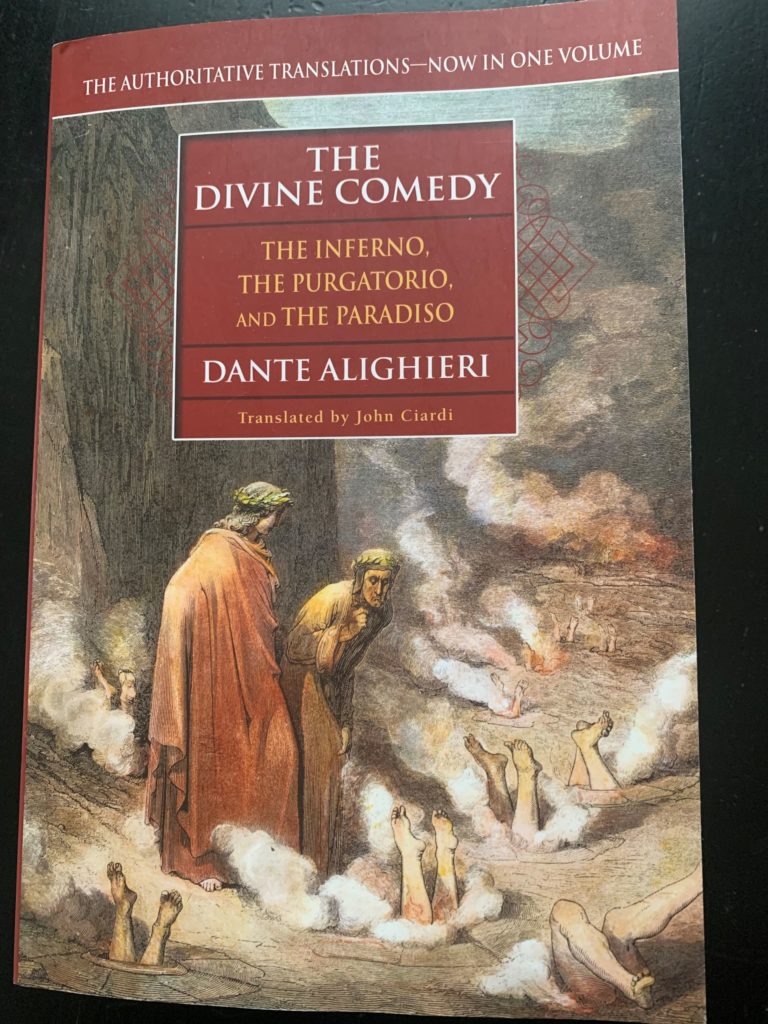Had I known what I was doing, I would included Canto III last week. It is not considered a level but the crossing into the afterworld. I would call that introductory information but I was relying on another reference to help me get started. Oh well, We get the vestibule or entrance, the crossing and the first level of hell this week.

The vestibule is an interesting concept. According to Dante is is filled with fallen angels that the translator calls Opportunists. These are entities that didn’t pick a side (that is God or the Devil) and therefore were into the game for themselves. Consequently, they are denied entry into the afterworld neither heaven nor hell. They are chased endlessly by bugs as the spirits wish for a place to go.
Level one is also interesting. Last week I mistakenly said Virgil did not have a place. Actually, he is in the first level because He lived before Christ. All pagans are in this level because they were not blessed to have the opportunity to be Christian. It seems like this level isn’t too bad relatively speaking. It is the moaning of restlessness. Apparently there is nothing to do and the realization that this is the best it will ever get.
It is not completely apparent to me, but the translator indicates that this work is not just religious work but also a social and political commentary. Some of the notes related to the verse indicate contemporary figures in hell as well. There is reference to Boniface VII who became pope by manipulation. I would have never understood that without the note from the translator.
This week I am going to talk specifically about the pagans as they are described. Within the text is says that when Christ was crucified most of the previous population was in level one. That being said certain people were removed from hell and went with Christ. These would be people like Moses, Noah, Daniel, etc, the heroes of the old testament.
When I was really young, I was told that animals would never go to Heaven because they didn’t have a soul. Later, I decided that that was not possible because I didn’t want it to be true I really loved my dog, how could I be denied my dog in heaven? Since then, I have come to modify that belief a little. I am not sure if we will see our pets in the afterworld for our sake. But, they really have no free will so how could they possibly have an afterlife? Maybe reincarnation is a better explanation of animals?
Now that is settled, we as Christians have to look at the Bible in its entirety. Supposedly, Christ is the new covenant of our relationship with God. He has been described as a vengeful god in the Old Testament. That is why he drowned the world in Noah’s time. Aside from particular instances, surely not every single individual besides those mentioned in the old testament lacked the complete requirements for heaven. How is it possible that Moses was in hell until Christ arrived?
I am going to try and not hold that against Dante because I just cannot believe that and be consistent with my beliefs. Supposing that I am somewhat right, there has to be a plan for the people that existed before Christ or out of the earshot of Judaism. What about Asia or the American Natives? Surely we are all God’s people? I can’t believe that they would be condemned to hell by their existence being away from the proximity of the middle east and the ability to communicate across vast distances.
End Your Programming Routine: Next week is Canto V, the second level of hell described as carnal. According to Dante, I suppose it is fortunate that I am a Christian. Otherwise, I would have no chance at heaven. I am not here to take down Dante per se but to analyze and provide commentary on The Divine Comedy. I am sure that we are going to not just be entertained, but also learn something useful for our eventual eternity. I am more than sure we are going to find lots of behaviors to agree on before we are done.
Recent Comments